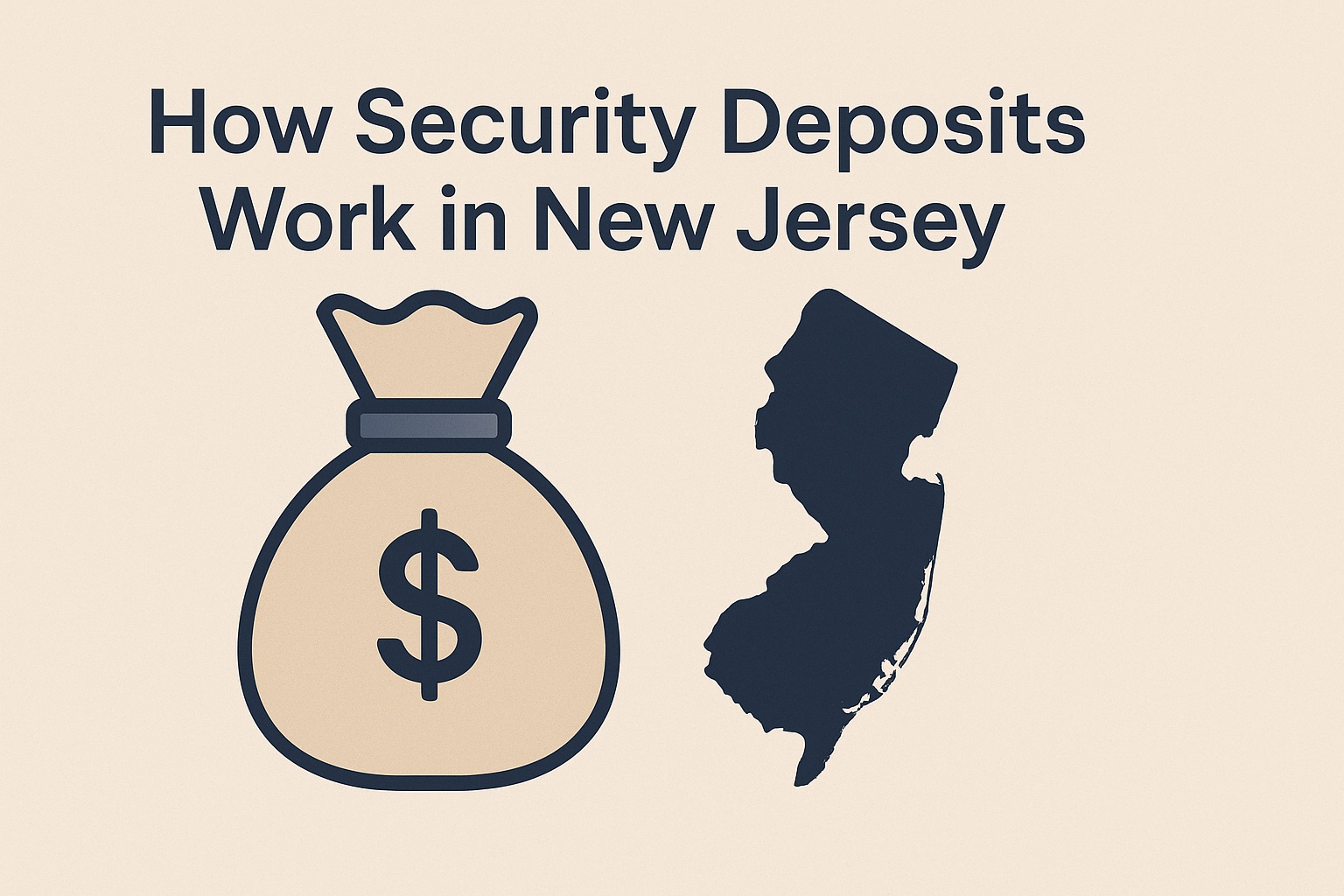How Security Deposits Work in New Jersey
New Jersey’s Security Deposit Law is strict and detailed. This overview summarizes key points for landlords and property managers. Always confirm current rules using the official state resources linked below before acting.
1) The Basics: What Counts as a Security Deposit
Any money paid to secure performance of a lease is a security deposit—even if it’s called a “pet deposit” or “last month’s rent.” The deposit remains the tenant’s property and must be held in trust, separate from operating funds. The official state statute governing this is N.J.S.A. 46:8-19.
2) Maximum Amount & Increases
- Collection cap: You may not collect more than 1.5× one month’s rent as a security deposit .
- Annual increases: You can raise the deposit during tenancy by no more than 10% per year.
3) Where & How to Hold the Money
Landlords must place deposits in a qualifying New Jersey financial institution or investment account that earns interest for the tenant. Commingling with other funds is prohibited.
- 10+ units: Deposit into an insured money market fund or interest-bearing account in a New Jersey bank.
- Under 10 units: Use an interest-bearing savings or time account at a New Jersey financial institution.
- No deductions: Interest earned belongs entirely to the tenant.
4) Required Written Notices
Within 30 days of receiving a deposit—and within 30 days of changing banks or ownership—you must send written notice including:
- Name and address of the bank/investment company,
- Type of account/investment, interest rate, and amount held.
You must also pay or credit interest every year and provide written notice of the payment or credit. Tenants can elect to apply the interest to rent.
5) Tenant Remedies for Noncompliance
If you fail to follow these rules—such as not giving the notice or not keeping funds in a proper account—the tenant may demand in writing that the deposit plus interest be applied toward rent. You may not collect another deposit while the tenant remains in possession (N.J.S.A. 46:8-19(e)).
6) Property Transfers
When property ownership changes, the prior owner must transfer all deposits and interest to the new owner, who assumes responsibility. Both the former and new owners must notify tenants in writing. Learn more at the.
7) Returning the Deposit
- Timeline: Return deposits within 30 days after lease termination.
- Delivery: Personal delivery or certified/registered mail to the tenant’s last known address.
- Itemization: Provide a detailed list of interest earned and any deductions with receipts or estimates..
8) Shorter Deadlines in Special Situations
- Domestic violence early termination: Deposit must be available within 15 business days; landlord must send written notice within 3 days (N.J.S.A. 46:8-21.1(b)).
- Displacement (fire, flood, condemnation): Make funds available within 5 business days upon request and notify tenant within 3 days of where to pick up the deposit.
9) Deductions: What’s Permitted
- Allowed: Unpaid rent, utilities, and repair costs for damage beyond normal wear and tear (with receipts).
- Not allowed: Routine cleaning or ordinary depreciation such as small nail holes or carpet wear.
10) Penalties for Wrongful Withholding
If you withhold funds improperly or miss the deadline, a tenant may file a complaint in court. Judges can award double the amount wrongfully withheld, plus court costs and attorney’s fees. See N.J.S.A. 46:8-21.1(a).
11) Practical Workflow
- Deposit funds in a qualifying NJ bank account immediately after collection.
- Send written notice to the tenant within 30 days (bank, account type, amount, interest rate).
- Track interest and pay/credit it annually with written confirmation.
- Document move-in and move-out condition with dated photos and inspection forms.
- Within 30 days after move-out, mail the balance and itemization to the forwarding address.
12) Recordkeeping Essentials
- Copy of every notice (initial and annual interest).
- Bank statements showing the separate account and interest earned.
- Move-in/move-out photos and condition reports.
- Invoices, receipts, and communications related to any deductions.
13) Common Mistakes to Avoid
- Collecting over 1.5× rent or increasing the deposit by more than 10% annually.
- Using a personal or operating account for deposits.
- Missing the 30-day notice or failing to send annual interest notices.
- Returning the deposit late or without a detailed itemization.
Checklist: Provide written notice within 30 days • Track & pay/credit interest annually • Document condition at move-in/out • Send itemization and balance on time • Use certified/registered mail or personal delivery as required.
Disclaimer: This article is for general information only and not legal advice. Always consult official state publications and qualified legal counsel for your specific case.

